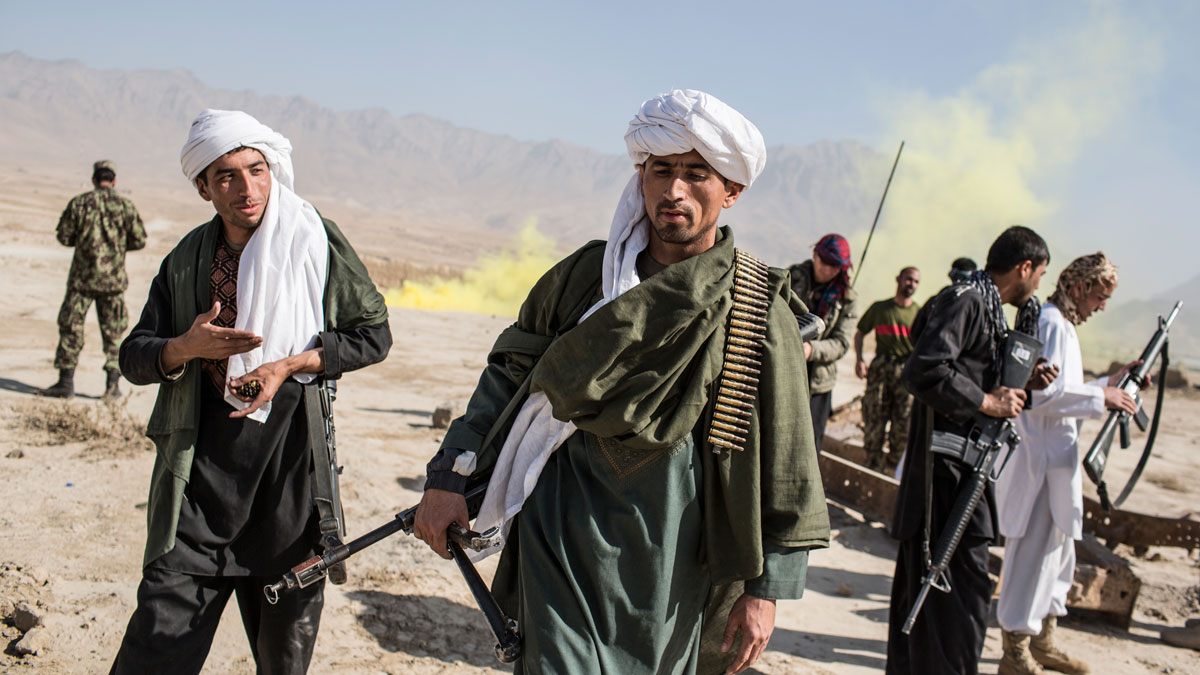Taliban strikes deep into Helmand province
Militant group now controls three districts captured by British and US forces during the Afghanistan war

A free daily email with the biggest news stories of the day – and the best features from TheWeek.com
You are now subscribed
Your newsletter sign-up was successful
Taliban insurgents have made further gains in Helmand this week, seizing a strategically significant district headquarters on Monday despite bombing by US warplanes and resistance from the Afghan army.
Militants overran Helmand's Musa Qala district on Monday – an area that was originally taken from them by British and Afghan forces in 2008.
US warplanes bombed the advancing Taliban over the weekend, killing 40 fighters, but the insurgents regrouped and overran Musa Qala, forcing district government forces to retreat, Newsweek reports.
The Week
Escape your echo chamber. Get the facts behind the news, plus analysis from multiple perspectives.

Sign up for The Week's Free Newsletters
From our morning news briefing to a weekly Good News Newsletter, get the best of The Week delivered directly to your inbox.
From our morning news briefing to a weekly Good News Newsletter, get the best of The Week delivered directly to your inbox.
"Afghan special forces, police and commandos have been deployed to Helmand in order to retake Musa Qala district. Foreign air strikes are backing our forces," said Afghan defence ministry spokesman Dawlat Waziri.
The Taliban victory follows a withdrawal last week by Afghan soldiers from Nawzad – a neighbouring district captured by British and American troops during the war.
The withdrawal, in conjunction with the assault on Musa Qala, gives the Taliban control of three districts in northern Helmand as well as partial control of other parts of the region, including Kajaki, which allows them to disrupt the power supply from a large US-built hydroelectric dam.
What happens next?
A free daily email with the biggest news stories of the day – and the best features from TheWeek.com
A senior official in the Afghan Army’s 215 Maiwand Corps told the New York Times that "foreign forces" would be providing air support as the Afghan army moved to take Musa Qala back.
However, the loss of control of the region raises further questions over the achievements of US and UK forces in Afghanistan. As the UK ended combat operations in Afghanistan last year, the restoration of security in the most densely populated areas – the "green zone" – either side of the Helmand river was regarded as one of the allies' most significant successes, the BBC says. Consequently, the return of fighting to the region will be seen as a major blow as the Taliban's power continues to increase and poppy growing remains at record levels.
-
 Palantir's growing influence in the British state
Palantir's growing influence in the British stateThe Explainer Despite winning a £240m MoD contract, the tech company’s links to Peter Mandelson and the UK’s over-reliance on US tech have caused widespread concern
-
 Quiz of The Week: 7 – 13 February
Quiz of The Week: 7 – 13 FebruaryQuiz Have you been paying attention to The Week’s news?
-
 Nordic combined: the Winter Olympics sport that bars women
Nordic combined: the Winter Olympics sport that bars womenIn The Spotlight Female athletes excluded from participation in demanding double-discipline events at Milano-Cortina
-
 Epstein files topple law CEO, roil UK government
Epstein files topple law CEO, roil UK governmentSpeed Read Peter Mandelson, Britain’s former ambassador to the US, is caught up in the scandal
-
 Iran and US prepare to meet after skirmishes
Iran and US prepare to meet after skirmishesSpeed Read The incident comes amid heightened tensions in the Middle East
-
 Israel retrieves final hostage’s body from Gaza
Israel retrieves final hostage’s body from GazaSpeed Read The 24-year-old police officer was killed during the initial Hamas attack
-
 China’s Xi targets top general in growing purge
China’s Xi targets top general in growing purgeSpeed Read Zhang Youxia is being investigated over ‘grave violations’ of the law
-
 Panama and Canada are negotiating over a crucial copper mine
Panama and Canada are negotiating over a crucial copper mineIn the Spotlight Panama is set to make a final decision on the mine this summer
-
 Why Greenland’s natural resources are nearly impossible to mine
Why Greenland’s natural resources are nearly impossible to mineThe Explainer The country’s natural landscape makes the task extremely difficult
-
 Iran cuts internet as protests escalate
Iran cuts internet as protests escalateSpeed Reada Government buildings across the country have been set on fire
-
 US nabs ‘shadow’ tanker claimed by Russia
US nabs ‘shadow’ tanker claimed by RussiaSpeed Read The ship was one of two vessels seized by the US military